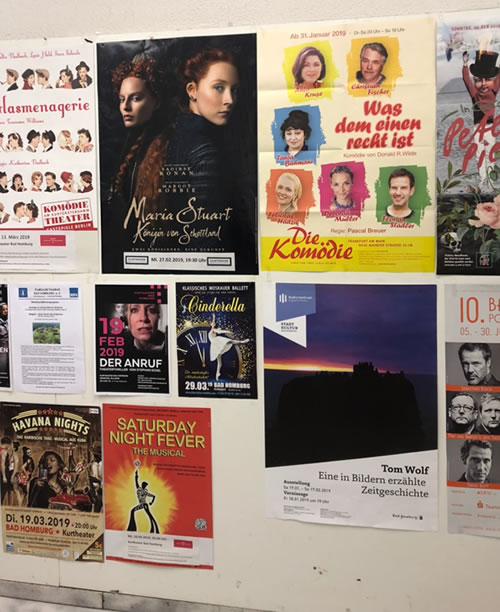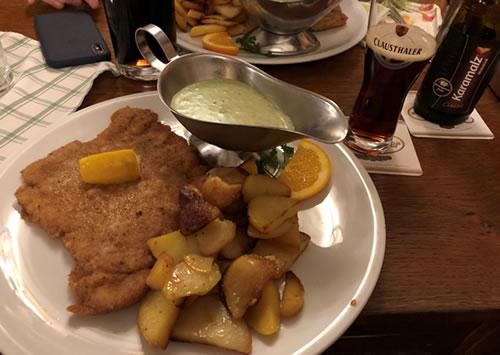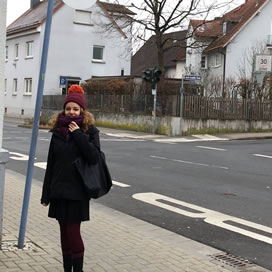Work and Play in Deutschland
Article and photos by Sylvia Robertson
Published 11/14/2019
 |
| Frankfurt from the river. |
A man lights up a cigarette while sitting at an outdoor café. He inhales the smoke as he picks up a jug of pale, golden, barley-derived liquid. It’s 5 pm on a Tuesday. He takes a sip and types a message on his smartphone while slowly exhaling, enjoying his Feierabend. Suddenly, whoosh, the train passes, and you are awakened by the advanced transportation system that connects Deutschland. The scent of sizzling bratwurst alerts you that it’s time to eat, and you snap out your lost-in-observation trance.
When overseas, it’s natural to become more intensely fascinated by people, food, architecture, nature, and other sensory experiences. Exposing yourself to a new way of life expands your awareness and understanding of other people and their culture. If you would like to experience something new but don't currently have a huge sum of money to explore, going through an au pair program or using an international au pair agency provides a unique opportunity. The agency or program allows young adults to live with a host family in a country abroad for an agreed-upon duration in exchange for childcare and domestic responsibilities. Many households all over the world are currently searching for au pairs to become a part of their family. Based on my own experience over the course of a year, I’ll specifically address au pair life in Germany.
What is an au pair? Au pair is French for “on par,” referring to an equal give-and-take, or the symbiotic relationship between host family and employee. In Europe, at least in the case of my job found at AuPairWorld, the host family must provide a certain minimum: a bedroom, food, health insurance, the option to attend an official language class, and spending money (I received 260 euros at the end of each month). Some families may be willing to pay your flight and maybe even a slightly higher monthly payment, but don’t expect to become rich. It’s not about the money. It’s about cultural exchange in the ideal situation, which is priceless. Before embarking on such a journey, it’s important to think about the pros and cons of being an au pair.
Pros and Cons of Being an Au Pair
Pros
- Become a member of a new family
- Find out about another way of life 4,000 miles away
- Experience actual day-to-day life in a new country, quite apart from glittery social media photos
- Find out what the locals do for fun
- Discover what locals eat
- Discover the unique rituals of locals
- Find out how the local educational system is different
- Develop self-confidence, independence, and persistence as you navigate life in a new country
- Learn a foreign language!
- Live with a local family provides complete immersion — perhaps the best way to learn. And speaking with young kids especially helps.
Cons
- There could be a conflict with the host family. In the worst-case scenario, everything blows up, and you need to find a new family.
- Cultural differences could prove too awkward
- You must adapt to the host family’s lifestyle — no ifs, ands, or buts!
- You’re constantly on-call
- The monthly pocket money (taschengeld) provided in exchange for your work is insufficient for long-term travel
|
 |
| View from the restaurant in a hotel in Rüsselsheim. |
Travel and Leisure
Based on my experience, Germans seem to have mastered the concept behind "work hard, play hard." I base this generalization chiefly on the German use of language. For instance, there’s a special word for the time of day after work. It’s not just any Abend (evening), but a Feierabend (party evening). Such a word doesn’t even exist in the English language. In Germany, when clocking out, co-workers say good-bye with “Schönen Feierabend.” Another phrase often heard is Kaffeepause (coffee pause). After working diligently for some time, you earn a break to drink coffee. No doubt other countries have coffee breaks as well, but the Germans have combined the word coffee and break together into a new word. Most Germans are very efficient; they take pride in knowing when to get tasks done but also when to enjoy the simple things in life. While many visitors mistake their seriousness for coldness, Germans would most likely reply that there’s a time to be 100% serious.
 |
| Kaffeepause. |
German families expect a hardworking and fastidious au pair, so if behavior or actions are politely corrected, don’t take it personally. They seek au pairs who fold laundry to perfection, pick the kid(s) up from school on time to the minute, and reply to their texts in a timely manner. By “constantly on-call,” I mean that you could be out enjoying an evening with a friend, but if the family messages or calls you for whatever reason, they want you to answer. Being an au pair consists in adapting to another family’s way of life. You must be ready for anything, but don’t allow yourself to be a servant. You’re not traveling to another country only to fulfill another family’s every request. As mentioned before, even the name of the au pair program/assignment implies an interdependent relationship. Putting the family first, although fair, shouldn’t mean disregarding all your own goals and desires.
Additionally, unless the family takes advantage of your time and energy, they should want you to have some fun. As stated in the program contract, you get 4 free evenings and one free day per week. Your free day can be any day of the week. However, most families will likely ask you to choose Saturday or Sunday because you probably need to walk with the children to and from school during the week. One Sunday per month must be free. Furthermore, the contract doesn’t let you work more than 6 hours per day and 30 hours per week, so if the family demands more from you, it would be a violation of your rights as an au pair. As far as holiday time, you receive a paid holiday of 4 weeks since you stay a whole year.
If you want to travel, you must do so on a budget and make sure you have saved money before your arrival in Germany. As I learned from experience, the pocket money is largely meant for bus fees and going out for coffee or meals with friends — it runs out faster than you could imagine. An all-day bus ticket costs 4 euros, so if you ride the bus to language classes, meet friends out, etc., the expenses add up quite quickly. If you stay in a big city, instead of paying bus fees to get around the city you’ll need to pay for the U-bahn and S-bahn (Germany’s train system), unless you manage to walk or bike everywhere you’d like to go. As far as the cost of living, the first month being an au pair may come as a bit of a shock. However, if you budget wisely, you could probably plan a day trip or two each month. If you love traveling, try to find a host family who love to travel. In family’s profiles on the au pair websites, they will specifically mention bringing the au pair along on mini trips and big vacations. If you accompany the family on holidays, and they require you to work, this doesn’t count towards your paid holiday time.
 |
| German theater. |
Choosing a Family
To prevent a potentially unpleasant au pair experience, contact your host family ahead of time. You can begin to connect with registered families at AuPairWorld. Read the family profiles carefully and make sure their way of life and situation matches closely what you envision in terms of the number of kids, pets, and your location. Ask details about their kids, required duties and your expected schedule, the parents’ jobs, family hobbies, traveling, foods eaten, and general expectations. Tell them about yourself, why you’re good with kids, and when you’d like to start, etc. After messaging back and forth, plan a time for an extended video chat with both parents. If the chat goes well, the family may eventually decide to hire you. Just make sure also have a good gut feeling about the decision. They will email you a contract, which you must carefully read over, sign, and send back to them before your departure.
How do you know to trust that "good feeling" about a certain family? Ask many questions! Try to steer the discussion to feel like a cordial chat. During the video chat, ask how they imagine the contract’s 4 “free evenings” per week. Don’t accept “whenever” as an answer or it could end up causing future conflict. Expect a specific answer and write it down, so if any problems arise, you have a point of reference. For instance, suppose they say the free evening begins at 5 pm, but then they keep you at family dinner until 7 pm, you can say, “during our Skype call, you said the free evening begins at 5 pm.” The flexible approach (the family works around the au pair’s schedule, and vice versa) could seem desirable, but from personal experience, it’s problematic. It keeps you, as an employee, from planning anything. And having a social life should be a vital part of any young person’s time abroad.
 |
| Schnitzel with green sauce and potatoes (very German). |
Making Friends Abroad
Although making friends in a new country can feel like a daunting task, it’s clearly possible. Surprisingly, it can be easier than in your own country. Why? Just being from a completely different culture often becomes a conversation starter. Unless you already speak flawless German, most people will know within seconds of meeting you, “this person isn’t from here.” Embrace feeling like a foreigner, language gaffes, and behavioral faux pas. If you learn to laugh at yourself, others will admire your ability to make yourself vulnerable and immerse yourself in their world — after all, they are the host country.
You never know where you could meet friends. Be open! Language classes, the gym, or the host family’s neighborhood are possible locations to meet nice people your age. Also, you can check out au pair Facebook groups in your region. No matter where you are, making friends occurs often occurs in multiples. The hardest part is meeting that first friend. Once you meet one, then he/she introduces you to 2 friends, and each of these people can introduce you to 2 friends, and so on. Before you know it, you will have quite a social life.
 |
| Outdoor artwork: A steel tree. |
Language
Living with a German family provides astounding language learning benefits. Often, teachers instruct us how to string words together to build sentences and give us a list of vocabulary words to remember. Consequently, students use languages to say what they would normally say in English but replace the words like a puzzle. I didn’t get a list of words and recite “decke is dog bed, decke is dog bed, decke is dog bed,” for example, but through hearing the family forcefully shout “Decke!!!!” to their dog while pointing to his bed, I learned the way a child would learn. In fact, many German expressions can’t be directly translated from English because every language has different speech patterns.
As a bonus, by learning another language, we gain insight into another’s identity. The language we grew up speaking clearly reflects our cultural identity. Adaptation to a new language can be challenging since we must understand and interact with people who grew up with another cultural identity — one completely different from our own — but a connection is often forged naturally over time.
Au Pair Visa
An au pair visa is required in Europe if you wish to stay longer than three months. The visa, which can you can apply for if you wish to stay in Germany, as I did, lasts anywhere between 6 months to 1 year. Before obtaining a visa, you need to go to the Einwohnermeldeamt (Residence Registration Office). There you and your host mom or dad must fill out paperwork to receive a Anmeldebestätigung. Then, you have proof of your living address, which you will need for the visa application, among other things, such as a German bank account where your monthly payment can be deposited, and a gym membership, if desired.
Subsequently, your host family needs to show you where the Ausländerbehörde (Foreigner Registration Office) is located. There, you can apply for your visa with the following required documents: your passport, a few passport photos, the signed Au Pair Contract, proof of health insurance (covered by the host family), and a 100-euro fee (not always covered by host family).
The Initial Arrival
Walking off the airplane into the unique atmosphere of Germany, seeing endless unreadable signs, you make your way to baggage claim. Waiting for the moment when you finally meet a member of your host family face-to-face involves a jumble of emotions. Most likely, you will look exhausted from the flight, but you know the necessity of making a good first impression. Enjoy the exciting meeting and the new surroundings. Be proud of yourself when you order your first marzipan-filled croissant and coffee in German. Why? Before you know it, the initial thrill will be gone though still be appreciated. Soak in those first days, so when the day arrives that this country begins to feel more like your second home than a getaway, you can look back and see the progress you have made. Maybe Germany will even become your permanent home. Who knows?
For more information about au pair jobs, see AuPairWorld.
 |
Sylvia waiting at the bus stop on a cold winter day. |
. |
Sylvia Robertson is a Purdue University graduate currently taking a gap year in Germany. Other than English, she speaks French, some Spanish, and is now studying German at an intermediate level. |
|
